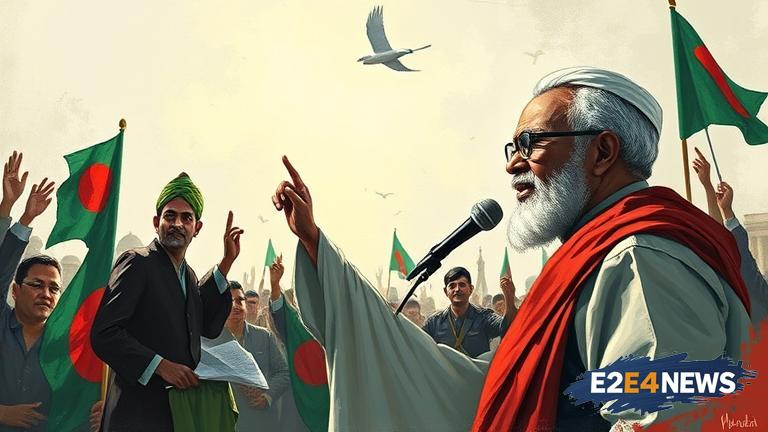On the anniversary of Bangladesh’s revolution, Nobel laureate Muhammad Yunus has urged the government to implement reforms to address the country’s social and economic challenges. Yunus, who is known for his pioneering work in microfinance, emphasized the need for a new era of development that prioritizes the welfare of all citizens. He highlighted the importance of creating opportunities for the youth, promoting entrepreneurship, and ensuring access to education and healthcare. Yunus also stressed the need for good governance, transparency, and accountability in the government and public institutions. He criticized the current state of politics in Bangladesh, saying that it has become increasingly polarized and divisive. The Nobel laureate called for a national dialogue to bring together people from different backgrounds and ideologies to discuss the country’s future. He also emphasized the need for the government to engage with civil society and the private sector to find solutions to the country’s problems. Yunus praised the progress made by Bangladesh in recent years, but warned that the country still faces significant challenges, including poverty, inequality, and climate change. He said that the government needs to take bold steps to address these challenges and ensure that the benefits of growth are shared by all. The anniversary of the revolution is a significant event in Bangladesh, marking the country’s struggle for independence and self-determination. Yunus’s call for reform is likely to resonate with many Bangladeshis who are seeking change and a better future. The government has responded to Yunus’s comments, saying that it is committed to implementing reforms and improving the lives of all citizens. However, critics say that the government needs to do more to address the country’s deep-seated problems. The international community is also watching Bangladesh’s progress closely, with many countries and organizations providing support and assistance to help the country achieve its development goals. Despite the challenges, Bangladesh has made significant progress in recent years, including reducing poverty and improving access to education and healthcare. The country has also become a major player in regional and global affairs, with a growing economy and a increasingly important role in international trade and diplomacy. However, the country still faces many challenges, including corruption, inequality, and social injustice. Yunus’s call for reform is a reminder that there is still much work to be done to ensure that Bangladesh achieves its full potential and becomes a prosperous and equitable society. The Nobel laureate’s comments have sparked a lively debate in Bangladesh, with many people calling for change and reform. The government has said that it is committed to listening to the concerns of citizens and implementing reforms to address the country’s challenges. As Bangladesh looks to the future, it is clear that the country needs to continue to evolve and adapt to the changing needs of its citizens. Yunus’s call for reform is a timely reminder of the need for ongoing effort and commitment to creating a better future for all Bangladeshis. The country’s development partners, including the international community, will be watching closely to see how the government responds to Yunus’s call for reform. With its rich culture, resilient people, and strategic location, Bangladesh has the potential to become a major player in the region and a model for sustainable development. However, the country needs to address its challenges and implement reforms to ensure that all citizens can benefit from growth and development. The anniversary of the revolution is a significant reminder of the country’s history and its struggle for independence and self-determination. As Bangladesh looks to the future, it is clear that the country needs to continue to work towards creating a more just and equitable society, where all citizens can thrive and reach their full potential.





